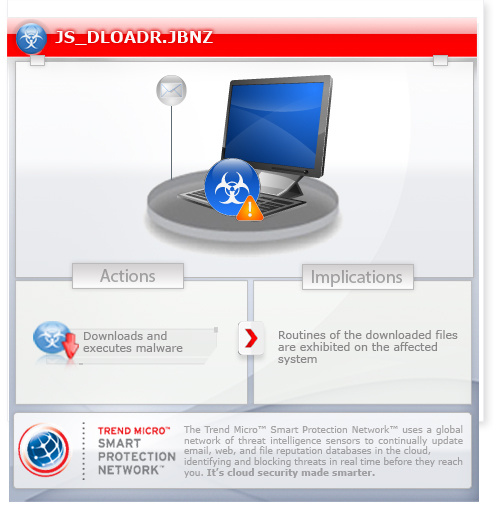JS_DLOADR.JBNZ
Windows


Threat Type: Trojan
Destructiveness: No
Encrypted: Yes
In the wild: Yes
OVERVIEW
Spammed via email
This malicious JavaScript downloads and executes a CryptoWall 3.0 ransomware variant and a FAREIT spyware. It comes as an archived file that is sent as an attachment in spammed messages.
To get a one-glance comprehensive view of the behavior of this Trojan, refer to the Threat Diagram shown below.

This is the detection for the malicious JavaScript file contained inside an archived attachment that downloads CrpytoWall 3.0 and a FAREIT spyware variant.
This Trojan arrives on a system as a file dropped by other malware or as a file downloaded unknowingly by users when visiting malicious sites.
It executes the downloaded files. As a result, malicious routines of the downloaded files are exhibited on the affected system.
TECHNICAL DETAILS
6,606 bytes
JS
No
12 Mar 2015
Connects to URLs/IPs
Arrival Details
This Trojan arrives on a system as a file dropped by other malware or as a file downloaded unknowingly by users when visiting malicious sites.
Download Routine
This Trojan connects to the following website(s) to download and execute a malicious file:
- http://{BLOCKED}ttlokolrt.com/images/one.jpg
- http://{BLOCKED}tlokolrt.com/images/two.jpg
It saves the files it downloads using the following names:
- %User Temp%\542824559.exe
- %User Temp%\589878543.exe
(Note: %User Temp% is the user's temporary folder, where it usually is C:\Documents and Settings\{user name}\Local Settings\Temp on Windows 2000, Windows Server 2003, and Windows XP (32- and 64-bit); C:\Users\{user name}\AppData\Local\Temp on Windows Vista (32- and 64-bit), Windows 7 (32- and 64-bit), Windows 8 (32- and 64-bit), Windows 8.1 (32- and 64-bit), Windows Server 2008, and Windows Server 2012.)
It then executes the downloaded files. As a result, malicious routines of the downloaded files are exhibited on the affected system.
SOLUTION
9.750
11.534.09
12 Mar 2015
11.535.00
13 Mar 2015
Step 1
Before doing any scans, Windows XP, Windows Vista, and Windows 7 users must disable System Restore to allow full scanning of their computers.
Step 2
Search and delete this file
Step 3
Scan your computer with your Trend Micro product to delete files detected as JS_DLOADR.JBNZ. If the detected files have already been cleaned, deleted, or quarantined by your Trend Micro product, no further step is required. You may opt to simply delete the quarantined files. Please check this Knowledge Base page for more information.
Did this description help? Tell us how we did.

